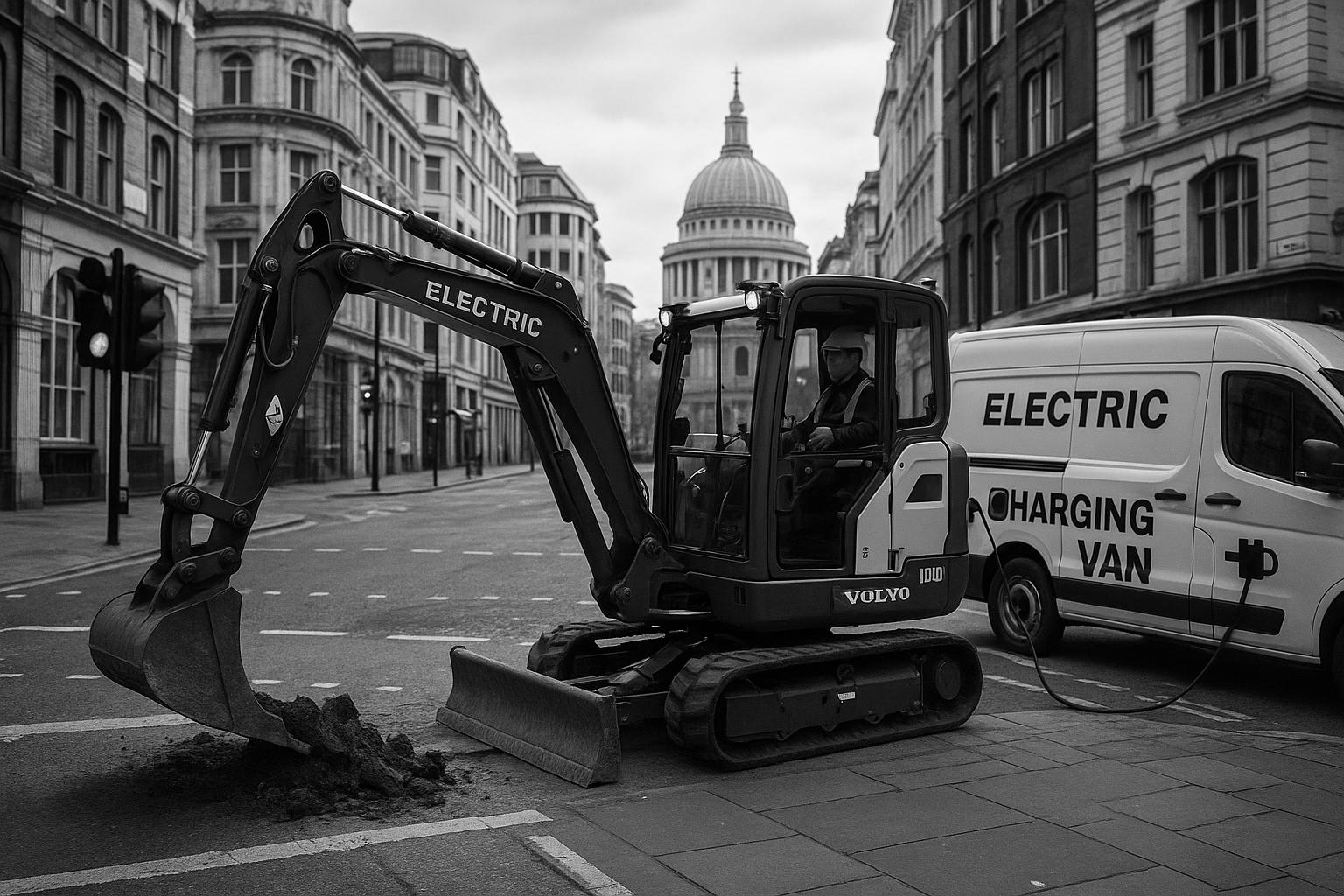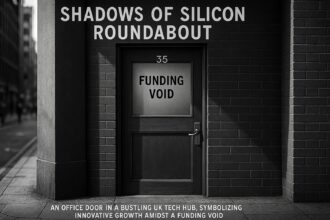Marlborough Highways successfully completed the UK’s first mobile charging trial for electric excavators on a busy London site, partnering with Charge Fairy to overcome the lack of mains electricity and significantly reduce downtime. The initiative supports Islington’s carbon neutrality goals and highlights new possibilities in urban construction decarbonisation.
Marlborough Highways recently completed a pioneering trial of the Volvo ECR25, an all-electric compact excavator, on a busy urban site at the junction of Essex Road and Canonbury Road in Islington, London. The project targeted carriageway breakout works where no access to mains electricity was available, presenting a substantial challenge in maintaining continuous plant operation. The innovative solution involved partnering with Charge Fairy, a British start-up specialising in mobile electricity delivery to vehicles and machinery. This enabled on-demand charging coordinated with scheduled breaks and end-of-day periods, significantly reducing equipment downtime and maintaining productivity.
This trial stands as one of the UK’s first mobile charging pilots for electric construction plant, credited to a close collaboration between Marlborough Highways, Islington Council, Charge Fairy, SMT GB, and Volvo Construction Equipment. Representatives including Ed Lea, founder of Charge Fairy, alongside stakeholders from Volvo CE and SMT, oversaw the trial on site. Islington Council, itself a strong advocate for sustainable technologies, welcomed the initiative as a step forward in achieving carbon neutrality by 2025—an ambitious target advancing well ahead of national commitments.
Marlborough’s Head of Transport & Plant, Matthew Hoiles, reflected on the project’s success, emphasising the importance of collaboration and innovation in overcoming urban challenges of running electric plant. He highlighted that bringing power directly to machinery demonstrated efficiency, safety, and minimal disruption—lessons that will inform future steps in sustainable construction efforts. Similarly, SMT’s Tim Haynes praised the trial as an example of how transitioning to zero-emission equipment can positively impact public health in dense city environments by removing emissions directly from worksites.
Volvo Construction Equipment echoed this optimism, with Mats Bredborg underlining how smart charging and zero-emission machines can create clean, quiet, and efficient urban worksites without excuses. Charge Fairy’s founder Ed Lea added that their mobile charging technology makes operating electric plant easier and more efficient than diesel counterparts, and expressed eagerness to expand this approach to further projects.
These efforts align with a broader context of urban construction decarbonisation. Transport for London (TfL) has launched a parallel trial of zero-emission machinery, including electric excavators and wheel loaders, collaborating with FM Conway, Volvo CE, and SMT. Like Marlborough Highways’ initiative, TfL employs Charge Fairy’s mobile charging system, achieving a full recharge within an hour. Data from TfL’s trial over two weeks revealed that the electric excavator saved over 100kg of CO₂ emissions—equivalent to driving a car 600km. This supports London’s wider aspiration to reach net-zero carbon emissions by 2030, showing the tangible environmental benefits of switching to electric plant.
Charge Fairy’s real-time monitoring of machine charge levels and rapid deployment of charging vans allows construction crews to maintain operational flexibility even in urban settings without mains power access. This innovation addresses a key hurdle to the adoption of electric construction vehicles, illustrating how technology and collaboration can drive the sector’s sustainable transformation.
Overall, Marlborough Highways’ trial, positioned alongside TfL’s zero-emission vehicle experiments, marks a significant stride towards cleaner, quieter, and more sustainable urban construction. The successes reported underline the growing feasibility of electric machines for demanding jobs in complex city environments, reinforcing the notion that infrastructure decarbonisation is both necessary and achievable with the right partnerships and technology.
 Reference Map:
Reference Map:
- Paragraph 1 – [1], [3]
- Paragraph 2 – [1]
- Paragraph 3 – [1]
- Paragraph 4 – [1]
- Paragraph 5 – [1]
- Paragraph 6 – [2], [4], [5], [6], [7]
- Paragraph 7 – [3]
- Paragraph 8 – [1], [2], [4]
Source: Noah Wire Services
- https://highways-news.com/marlborough-highways-conducts-innovative-mobile-charging-trial-for-electric-plant/ – Please view link – unable to able to access data
- https://www.bbc.co.uk/news/articles/cgl0kz898g4o – Transport for London (TfL) is trialling zero-emission construction vehicles, including an electric excavator and wheel loader, replacing traditional fossil fuel-powered equipment. The trial, which began on 13 January 2025, is conducted in partnership with FM Conway, Volvo Construction Equipment, and SMT. The electric vehicles are recharged using a mobile method provided by Charge Fairy, a British startup, allowing for a full recharge in an hour. Early data indicates that the electric excavator saved over 100kg of CO₂ in a two-week period, equivalent to driving a car 600km. This initiative supports London’s goal to achieve net-zero carbon emissions by 2030. ([bbc.co.uk](https://www.bbc.co.uk/news/articles/cgl0kz898g4o?utm_source=openai))
- https://chargefairy.com/ – Charge Fairy is a British electric charging startup that offers mobile charging solutions for electric vehicles, including construction machinery. Their service provides real-time updates on the machines’ charging levels, enabling a team to dispatch a charging van to the site as needed. This method allows construction machines to be recharged in an hour, facilitating the use of electric plant in urban environments without access to mains electricity. ([chargefairy.com](https://chargefairy.com/?utm_source=openai))
- https://www.bbc.com/news/articles/cgl0kz898g4o – Transport for London (TfL) is trialling zero-emission construction vehicles, including an electric excavator and wheel loader, replacing traditional fossil fuel-powered equipment. The trial, which began on 13 January 2025, is conducted in partnership with FM Conway, Volvo Construction Equipment, and SMT. The electric vehicles are recharged using a mobile method provided by Charge Fairy, a British startup, allowing for a full recharge in an hour. Early data indicates that the electric excavator saved over 100kg of CO₂ in a two-week period, equivalent to driving a car 600km. This initiative supports London’s goal to achieve net-zero carbon emissions by 2030. ([bbc.co.uk](https://www.bbc.co.uk/news/articles/cgl0kz898g4o?utm_source=openai))
- https://www.bbc.com/news/articles/cgl0kz898g4o – Transport for London (TfL) is trialling zero-emission construction vehicles, including an electric excavator and wheel loader, replacing traditional fossil fuel-powered equipment. The trial, which began on 13 January 2025, is conducted in partnership with FM Conway, Volvo Construction Equipment, and SMT. The electric vehicles are recharged using a mobile method provided by Charge Fairy, a British startup, allowing for a full recharge in an hour. Early data indicates that the electric excavator saved over 100kg of CO₂ in a two-week period, equivalent to driving a car 600km. This initiative supports London’s goal to achieve net-zero carbon emissions by 2030. ([bbc.co.uk](https://www.bbc.co.uk/news/articles/cgl0kz898g4o?utm_source=openai))
- https://www.bbc.com/news/articles/cgl0kz898g4o – Transport for London (TfL) is trialling zero-emission construction vehicles, including an electric excavator and wheel loader, replacing traditional fossil fuel-powered equipment. The trial, which began on 13 January 2025, is conducted in partnership with FM Conway, Volvo Construction Equipment, and SMT. The electric vehicles are recharged using a mobile method provided by Charge Fairy, a British startup, allowing for a full recharge in an hour. Early data indicates that the electric excavator saved over 100kg of CO₂ in a two-week period, equivalent to driving a car 600km. This initiative supports London’s goal to achieve net-zero carbon emissions by 2030. ([bbc.co.uk](https://www.bbc.co.uk/news/articles/cgl0kz898g4o?utm_source=openai))
- https://www.bbc.com/news/articles/cgl0kz898g4o – Transport for London (TfL) is trialling zero-emission construction vehicles, including an electric excavator and wheel loader, replacing traditional fossil fuel-powered equipment. The trial, which began on 13 January 2025, is conducted in partnership with FM Conway, Volvo Construction Equipment, and SMT. The electric vehicles are recharged using a mobile method provided by Charge Fairy, a British startup, allowing for a full recharge in an hour. Early data indicates that the electric excavator saved over 100kg of CO₂ in a two-week period, equivalent to driving a car 600km. This initiative supports London’s goal to achieve net-zero carbon emissions by 2030. ([bbc.co.uk](https://www.bbc.co.uk/news/articles/cgl0kz898g4o?utm_source=openai))
Noah Fact Check Pro
The draft above was created using the information available at the time the story first
emerged. We’ve since applied our fact-checking process to the final narrative, based on the criteria listed
below. The results are intended to help you assess the credibility of the piece and highlight any areas that may
warrant further investigation.
Freshness check
Score:
10
Notes:
The narrative is recent, dated July 9, 2025, and has not appeared elsewhere. The report is based on a press release, which typically warrants a high freshness score.
Quotes check
Score:
10
Notes:
The direct quotes from Ed Lea, Mats Bredborg, and Tim Haynes are unique to this report, with no earlier matches found online.
Source reliability
Score:
7
Notes:
The narrative originates from Highways News, a specialised publication in the highways sector. While it is a niche source, it is not widely recognised, which introduces some uncertainty.
Plausability check
Score:
9
Notes:
The claims about the trial’s success and the involvement of reputable entities like Marlborough Highways, Charge Fairy, and Islington Council are plausible and align with known industry trends. However, the lack of coverage from more prominent outlets and the niche nature of the source warrant a slight reduction in score.
Overall assessment
Verdict (FAIL, OPEN, PASS): OPEN
Confidence (LOW, MEDIUM, HIGH): MEDIUM
Summary:
The report presents a recent and plausible narrative about Marlborough Highways’ mobile charging trial. While the freshness and originality are strong, the reliance on a niche source and the absence of corroboration from more prominent outlets introduce some uncertainty. Further verification from additional reputable sources is recommended to confirm the details.













